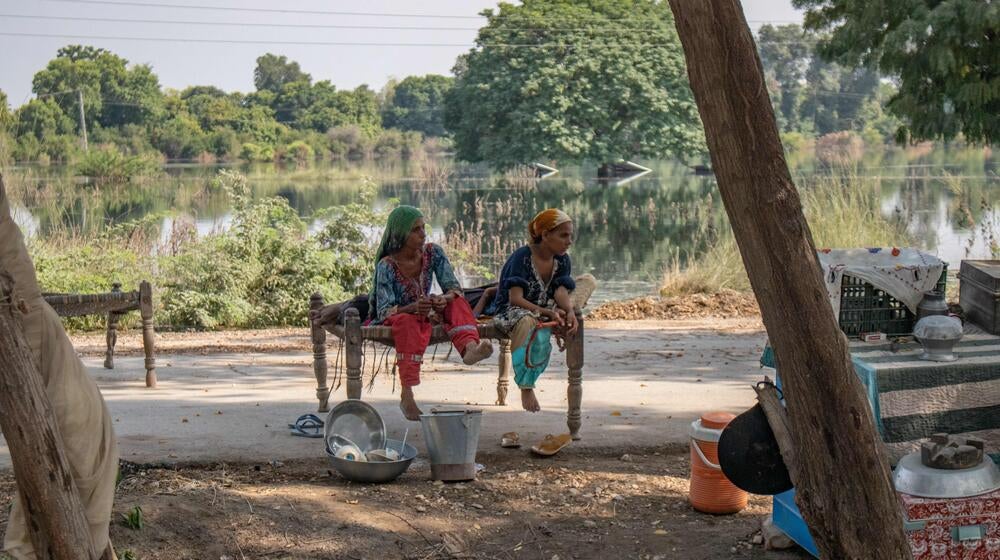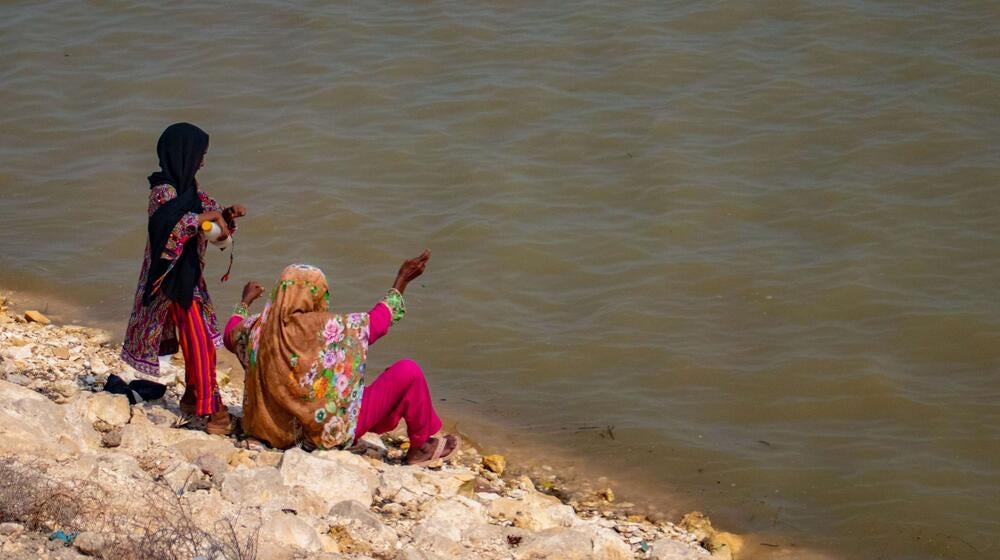Women and girls in Pakistan need urgent health and protection services amid epic flood disaster

BALOCHISTAN, Pakistan – “I walked for about 35 kilometers while in labor because the floods had damaged the road between my village and the hospital,” said Bakhtnama Khairullah, 32, from Harnai in Balochistan province.
Hers was one of the first areas to be hit by unprecedented monsoon rains that have engulfed one-third of the country. The mountainous terrain Ms. Khairullah trekked over is treacherous even on dry days — for a woman in labour in floodwaters, it was life threatening.
Now recovering at home after delivering healthy twins on Sept. 10, in the Harnai maternity hospital, Ms. Khairullah said she counts herself lucky: Some 7.6 million people are estimated to have been displaced by the devastating floods and landslides. At least 1,500 have died, while millions have lost their homes and means of feeding their families.
Over 1,400 health facilities have been damaged or destroyed across Balochistan and Sindh provinces, among which the maternity hospital where Ms. Khairullah gave birth. Dr. Sarmad Saeed Khan, a maternal, neonatal and infant health specialist, works with community midwives on a UNFPA-supported project at the hospital — including those who helped Ms. Khairullah.
“The midwives are working day and night tirelessly to provide maternity care and reproductive services during this emergency,” he said. “They’re doing heroic work ensuring safe deliveries for the flood-affected women coming to the hospital.”
The worst floods ever witnessed in Pakistan
Over 30 million people have been affected by the floods and 6.4 million are in need of humanitarian assistance. Among them are more than 1.6 million women of reproductive age, with nearly 130,000 pregnant women in need of urgent health services. More than 42,000 women are due to give birth in the next three months in the throes of the crisis.
“Without immediate support and access to medical and health services, these women’s lives will be in great jeopardy,” said Dr. Bakhtior Kadirov, UNFPA’s acting representative in Pakistan.
Not only have the floods flattened buildings, water and electricity sources are unsafe to use. Medical supplies and equipment have also been washed away. Many vulnerable people have been cut off from health centers and hospitals. Supply routes have been upended, as more than 12,000 kilometers of roads and hundreds of bridges linking remote areas to essential services have been obliterated. Where possible, pregnant women are being treated in temporary camps. Women and children — many now malnourished and contending with waterborne diseases like cholera, malaria and dysentery — stand in line for hours to receive medical attention.
Even before the floods, Pakistan had one of the highest rates of maternal mortality in Asia. This is now likely to rise further as women lose access to health care and anaemia cases, a leading cause of maternal death in the country, soar with malnutrition.

UNFPA expands emergency response
In the face of momentous logistical difficulties, UNFPA has set up a mobile health service to support people in displacement camps and to refer complicated cases to accessible hospitals. UNFPA is also providing hospital tents and life-saving supplies to affected areas so that vital health services such as skilled midwifery assistance and emergency obstetric care can continue.
Meanwhile UNFPA has distributed: over 8,000 dignity kits, which contain hygiene supplies including soap and menstrual pads, 7,000 kits with supplies for newborns, and 6,400 clean delivery kits to facilitate safe childbirth across multiple provinces.
Women and girls also face rising rates of gender-based violence. Displacement settings and distribution points are rife with the risk of sexual harassment, abuse and exploitation. These locations are especially risky for girls left alone while the adults go out in search of work. Makeshift living quarters are often cramped and badly lit. Men and women often have to share unsanitary bathrooms located far from their tents — increasing the potential exposure to violence.
Gender discrimination places young women and girls in further danger of child marriage or trafficking. UNFPA is supporting safe spaces for women and girls to offer a measure of protection, but more efforts are needed. Despite these challenges, Dr. Kadirov is adamant that UNFPA will do all it can.
“Pregnancies and childbirth can’t wait for emergencies or natural disasters to be over. This is when a woman and baby are vulnerable and need the most care,” he said.
UNFPA is appealing for $8 million to provide life-saving supplies and protection services to support women and girls in Pakistan.